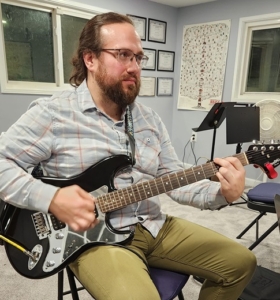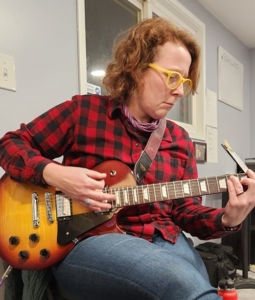How to Choose the Best Teacher or Guitar School
The guitar has come a long way, and it’s no longer something you can just teach yourself to master. If you want to be a good guitar player, you really need a great guitar teacher.
Take it from me, as I’ve taken lessons on-and-off my whole life, and still take them now: having a good guitar teacher helps you reach your goals way faster and easier. Sure, there’s a lot of information online and in books, but there’s also a ton of confusing and incorrect stuff out there. A good guitar teacher is like a guide, helping you understand and use the right information, saving you from a lot of frustration.
The 2 Most Important Things to Look For
When shopping for a guitar teacher, the most obvious questions to ask are about pricing and location. While these are important considerations, they are not the most important. The real key to a successful and enjoyable learning experience lies in two crucial factors: the progress you’ll make and the fun you’ll have along the way.
Progress
Progress is the heartbeat of any learning journey. It’s about moving forward, honing your skills, and becoming the guitarist you aspire to be. It’s about learning only the content that is relevant to where
Making steady progress is also about setting goals (which we do yearly and quarterly), tracking your progress (which we show you an easy way to do every week), and perhaps most importantly, giving you the time to implement and integrate what you’re learning. Helping you implement means allowing you to put the things you’re learning into actual real-life musical contexts, so you can really own it. Training you to integrate means showing you ways to tie in the new things with all other things you can already do well.
Fun
Equally important is the element of enjoyment. Learning an instrument should be a pleasure, not a chore. It’s about the excitement of discovering new melodies, harmonies, and rhythms, and the pure joy of creating music. Sometimes teaching content is not as important as inspiring students to go explore for themselves the new ways of thinking and approaching the guitar that are shown to them.
There are many ways that we inspire students at Guitar Lessons Ithaca. Here are just a few of them:
- monthly student jam sessions
- annual Student Concert
- annual Student Album
- ongoing ability to post original material or ask questions on Student Forum
- Student Parties, usually twice per year
- wide variety of different types of lessons (which we explain at the free trial),
Asking the Right Questions
A good guitar teacher does more than just teach. They help you organize your practice, build your confidence, and focus on being creative with your music. They care about your progress and make sure you really understand what you’re learning. Unlike other industries, there’s no official standard that must be adhered to for guitar teachers, so it’s up to you to find a good one.
Here are some questions to ask when looking for a guitar teacher:
Experience: Ask how long they’ve been teaching and how many students they’ve taught. It’s good if they have at least 3-5 years of experience.
Styles Taught: Find out what styles of music they are best at before saying what you want. Avoid
Cost: Good teachers are often not cheap. See “How to Cut the High Cost of Cheap Guitar Lessons.”
Approach: Ask how they teach. If they can’t adjust their teaching to what you want, they might not be the right teacher.
In addition to these, you may also want to inquire about things like:
Skills Taught: A good teacher can teach you to become a good musician, not just a guitar player. They are comfortable teaching things like techniques, music theory, ear training, reading notation, songwriting, and improvisation.
Recording Help: If you want to record your playing, a teacher who knows about this can be useful. (For an example of how teachers can show students the recording process, check out our Student Album Volume 6.)
Performance Options: Find out if they give any opportunities to perform in Student Concerts.
Music Business Knowledge: Some teachers can guide you on promoting your music and setting up gigs. (For examples of this, check out articles such as “Dealing with the Stress of Booking Gigs” or “Making Up Contracts For Gigs.”)
Why Free Trials Matter
To truly understand how much progress you’ll make and how enjoyable your lessons will be, you need to experience it for yourself. That’s why we offer free trial lessons. It’s an opportunity for you to step into the world of guitar learning, to feel the rhythm of the lessons, and to gauge the connection with your instructor.
Tailored Packages for Your Journey
Understanding the pricing structure is essential, and we offer a range of packages to suit different types of students. Our investment in your learning journey ranges from $35 to $50 per one-hour lesson, depending on the package that aligns best with your goals.
—
To discover the joy of guitar with a free trial lesson, either online or in-person, please fill out this form and expect a response within 24 hours.



